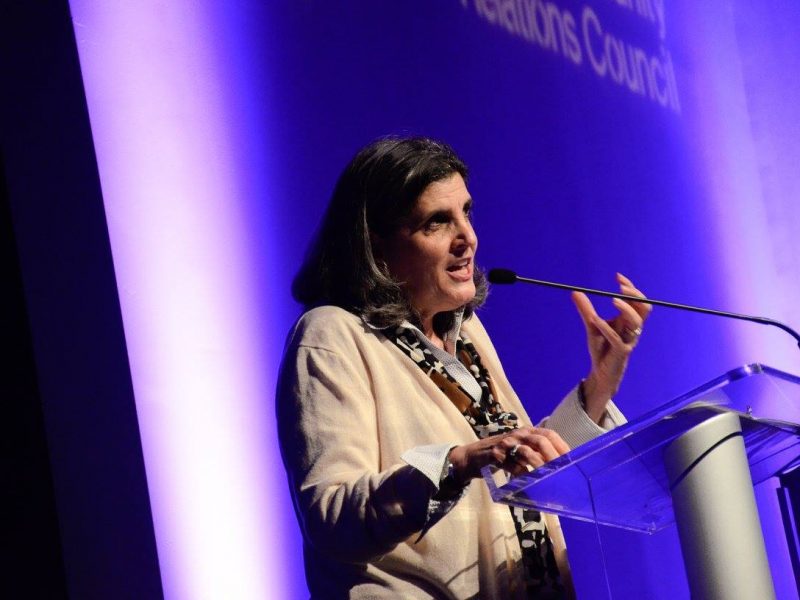Jewish Community Relations Council (JCRC)

The Art of Civil Discourse: Lessons for the 21st Century—By Rabbi Elka Abrahamson
Rabbi Elka Abrahamson, President of the Wexner Foundation, was the keynote speaker at the 78th Jewish Community Relations Council Annual Meeting in June. She shared lessons on fostering respectful debate and dissent in our community during this time of increasing polarization. Rabbi Abrahamson called upon ancient Jewish texts to illustrate the long history of debate in the Jewish community. Below are highlights from her talk.
No one will disagree that as a society, and within the Jewish community, the ability to talk effectively across ever wider gulfs of difference has eroded tremendously. Spend twenty minutes on Facebook or Twitter, and the depth of this problem will come swiftly into focus. You will observe how much verbal heat can be generated in a comment box and be simultaneously impressed and horrified by the sharpness with which an attack can be launched in the ever-popular space of 140 characters.
The Art of Civil Discourse
As a community, we are predisposed for heated argument. The art of civil discourse is woven tightly into our tradition. The Talmud represents a dense record of our disagreements: 63 tractates, thousands of pages of differences of opinion chronicled over time, shaping Jewish law and life.
The term machlochet (disagreement) has at its root the three letters that mean divided. Of course, disagreements can divide us, but the Hebrew language is exquisitely layered with possibility. That same root, chelek, also means a piece, one portion of a whole divided appropriately according to one’s need. A machlochet, a disagreement for the sake of Heaven, is one in which we acknowledge that each person around the table merits his or her piece, chelek, of the conversation. Imagine embracing the idea that when someone you vehemently disagree with advocates his or her position, that the discussion needs that opposing point for the discourse to be whole.
Our millennials are telling us that we need to listen more. We are desperate to engage with twenty- and thirty-somethings, yet we avoid uncomfortable topics because the established Jewish community does not want to or doesn’t know how to talk about those things. We—legitimately—shy away from taboo topics fearing we will lose funders and funding.
Motive Asymmetry
The unyielding truth at the center of this entire enterprise of civil discourse is that it is not about changing the minds or opinions or positions of the other. It is about the ability to meaningfully change one’s self.
In 2014 a scientific study was conducted among groups with seriously opposing positions—Palestinians and Israelis, Republicans and Democrats. Researchers discovered what is called political motive asymmetry. Motive asymmetry is the phenomenon of assuming that your ideology, your position, is based in love, but your opponents’ ideology is based in hate. It is common in charged conflicts. We can’t progress as a community with this asymmetry. It’s impossible.
Ideological Flexibility—Middah
We have to work on changing ourselves, on striving to be more symmetrical in our attitude toward the other. We need to practice what social scientists call ideological flexibility. Ideological flexibility does not require you or anyone else to change your mind, only to open it. It requires you to inquire and understand where the other person is coming from. Ideological flexibility compels us to develop the middah, the very Jewish trait embedded in our DNA—empathy.
Empathetic people of good will are curious about where the other is coming from. But there is one important caveat: we cannot begin those conversations in crisis or panic mode. We need to move toward and not away from difficult conversations lest we become a community of avoidance. In isolation, in ideological silos, in demanding rather than discussing, we become rigid; we become indifferent and utterly out of touch with any possible positions other than our own.
The Jewish Community Relations Council is one of over fifty programs and agencies funded in part by the Jewish Federation of Cincinnati.
The Jewish Federation of Cincinnati: We look at the whole picture, taking into account the diverse needs of the entire community. Together we can do almost anything.
Follow JCRC on Facebook here.

